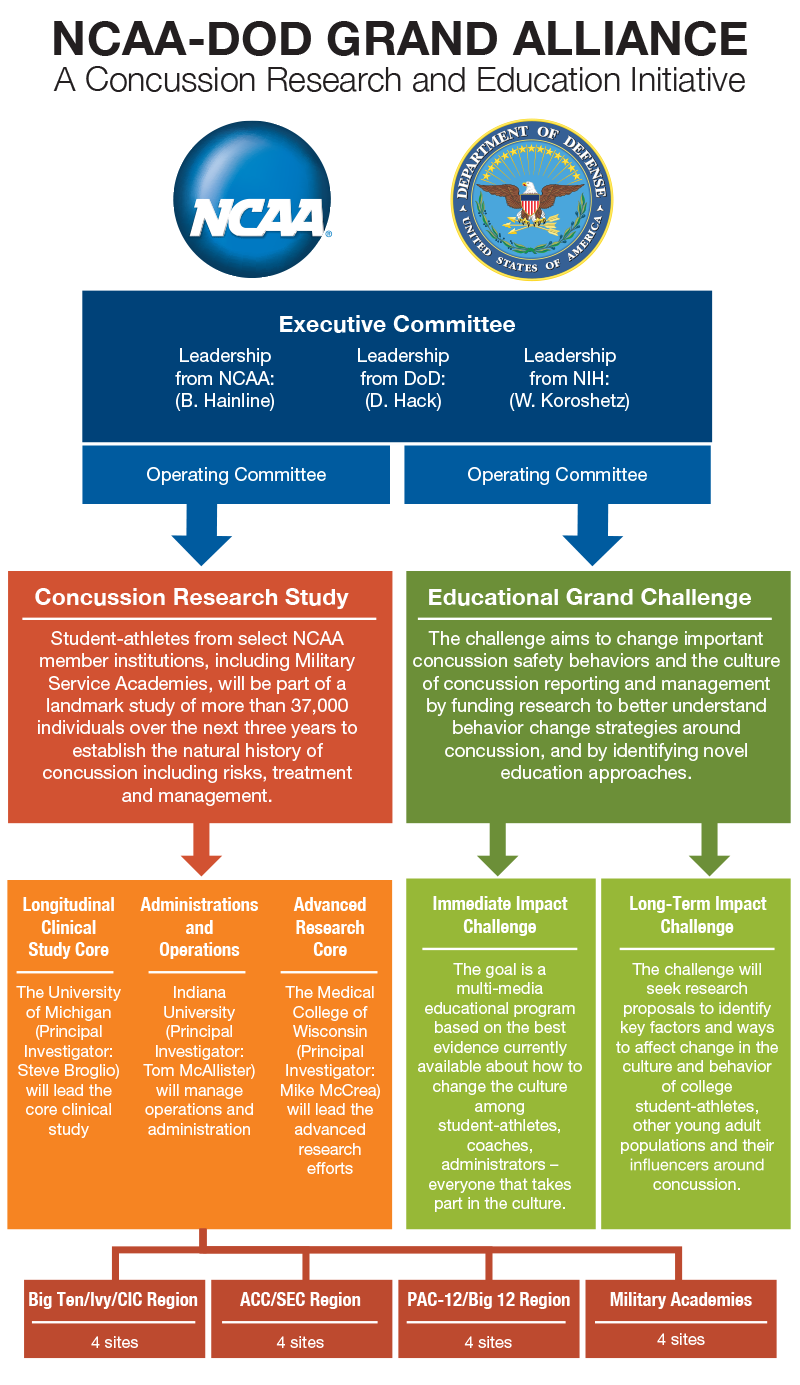The NCAA and the U.S. Department of Defense are embarking on a landmark $30 million initiative to enhance the safety of student-athletes and service members.
Announced at the White House Healthy Kids & Safe Sports Concussion Summit, the NCAA-DoD joint initiative will include the most comprehensive study of concussion and head impact exposure ever conducted.
Roughly 75 percent of the money will fund the study, which will enroll an estimated 37,000 male and female NCAA student-athletes over the three-year study period. Participants will receive a comprehensive preseason evaluation for concussion and will be monitored in the event of an injury. The investigation will be the largest ever of its type, offering critical insight to the risks, treatment and management of concussion.
The remaining 25 percent of the funding will finance an educational grand challenge aimed at changing important concussion safety behaviors and the culture of concussion reporting and management.
“NCAA schools have placed a priority on improved concussion management, but we still have many unanswered questions in this area,” said NCAA President Mark Emmert. “We believe in the incredible potential of this research. Student-athletes will be first to benefit from this effort, but it also will help to more accurately diagnose, treat and prevent concussions among service men and women, youth sports participants and the broader public.”
The research will be managed by the Concussion Assessment, Research and Education Consortium, or CARE, co-chaired by principal investigators at three research institutions:
- Indiana University will serve as the Administrative and Operations Core and will be the central coordination center for the CARE Consortium. Led by Thomas W. McAllister, M.D., chair of the IU School of Medicine Department of Psychiatry, Indiana will provide fiduciary oversight as well as data and analysis management, bioinformatics, biospecimen, and clinical trial support resources for the Consortium.
- The University of Michigan will lead the Longitudinal Clinical Study Core, a prospective, multi-institution clinical research protocol whose aim will be to study the natural history of concussion among NCAA student-athletes. This investigation will be the largest ever of its type. Steven Broglio, Ph.D., ATC, associate professor in the School of Kinesiology and director of the NeuroSport Research Laboratory, will lead the effort.
- The Medical College of Wisconsin will direct the Advanced Research Core. Led by Dr. Michael McCrea, Professor of Neurosurgery and Director of Brain Injury Research at MCW, this effort will include cutting-edge studies that incorporate head impact sensor technologies, advanced neuroimaging, biological markers and detailed clinical studies to examine the acute effects and early pattern of recovery from sport-related concussion. Ultimately, the work is designed to more fully inform a comprehensive understanding of sport-related concussion and traumatic brain injury.
The consortium’s work will expand upon the NCAA National Sport Concussion Outcomes Study, an existing multi-site, longitudinal investigation of concussive and repetitive head impacts in NCAA student-athletes. The Advanced Research Core also will leverage existing collaborative research networks, such as the National Institutes of Health TRACK-TBI and the DoD’s Project Head to Head.
Educational grand challenge
The educational grand challenge, which will open for submissions this September, seeks academic and private sector innovation to help change concussion safety behaviors and the culture of concussion reporting and management.
The immediate goal is to identify a novel, multi-media approach to educating student-athletes, coaches and other influencers about the risks of concussion and the need to report brain injuries in themselves and others. The content for the program will be established, so the challenge is open to any and all applicants who believe they can create an engaging multi-media education program.
The long-term challenge will seek research proposals to identify key factors and ways to change the behavior of college student-athletes around concussion, and those who contribute to a culture of underreporting symptoms.
“With these tools, we hope to encourage better prevention, protection and treatment methods on the sports field and ultimately, on the battlefield,” said NCAA Chief Medical Officer Brian Hainline. “Culturally, self-reporting head injuries or reporting others who display head injury symptoms is seen by some a sign of weakness. We hope to change that by arming physicians and scientists with better clinical data, and by creating educational programs to increase understanding of the importance of diagnostics for immediate action and tracking for follow-up treatment.”
















